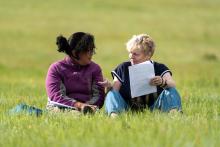A special educational project was launched this summer with the aim of familiarising teachers in Mongolia with STEM subjects. The aim is for the teachers to get their pupils interested in science subjects at an early age. The project focusses on nomadic children who receive their education in boarding schools, known as district and aimag schools, named after the country's administrative units. The Erasmus+ project is not TUBAF's first collaboration with Mongolia. It is part of a tradition of mutual support, a long-standing transfer of knowledge and the recruitment of professionals.
The raound about twenty children in the classroom at the school in Bayanchandman (Tuv Aimag province) carefully examine the coins lying on the tables in front of them. They are holding pipettes in their fingers with which they are carefully dripping water onto the coins. The topic of this lesson is surface tension. How many drops can fit on the small surface before the tension becomes too great and the water runs? "These are simple yet fundamental experiments that we want to use to get children interested in science," explains Kathrin Häußler, coordinator of the "Junior Researchers at TU Bergakademie Freiberg" network. The idea of getting young people interested in STEM and engineering subjects at an early age is nothing new at the university. Educational specialists from 90 daycare centres in the district of Central Saxony regularly come to Freiberg to take part in the "Junior Researchers" programme. And the idea has set a precedent.
Mongolian TUBAF alumni encourage the export of experience
In 2023, Kathrin Häußler received an enquiry from the Mongolian alumni association at TUBAF: Wouldn't the "Junior Researchers" project also be interesting for Mongolian children? "The Freiberg Alumni Association has existed since 2008," reports Bolormaa Dendev, founding member and head of the scientific liaison office of the Free State of Saxony in the Mongolian capital Ulaanbaatar since July 2024. She is involved in the project together with Professor Saran Galdansambuu and Kathrin Häußler. "The basic idea behind "Nomadenkinder" was to offer children in the countryside, especially nomadic children, the same educational opportunities as kids living in cities." Children in an urban environment have many opportunities for further education and training right on their doorstep. In contrast, there is a shortage of teachers in rural schools. During their first visits to Mongolian schools, the three realised that the teachers were just as interested as the children. So why not train these knowledge multipliers right away? "When the teachers then return to their schools, they pass on their knowledge to more than hundreds of children."
German-Mongolian exchange with a long tradition
The "Nomadenkinder" sub-project in the DAAD-funded ERAMSUS+ programme Mongolia is part of a long tradition of German-Mongolian cooperation. "The first Mongolian students came to study in Germany around 100 years ago, and to the TU Bergakademie Freiberg for the first time almost 50 years ago," explains Professor Carsten Drebenstedt, who has been involved in German-Mongolian cooperation for many years. "The first friendship agreement, as university cooperation agreements were called back then, was concluded with today's MUST (Mongolian University of Science and Technology) in 1986. Cooperation relations have been stable again since 1999," says Drebenstedt. This is where TUBAF's profile as a resource university comes into play. "From the 1960s to the 1980s, German-Mongolian teams systematically explored the country," reports Carsten Drebenstedt. This cemented the good reputation of Freiberg, where the responsible geological service was based, in Mongolia. However, concrete projects and personal contacts between the two sides have been decisive for the good cooperation over the last 25 years.
Videographer completes team
A film created by photographer and video journalist Andreas Hiekel from the university's media centre shows what these personal contacts look like. "This is work in progress," says Hiekel. In the summer of 2024, he accompanied his colleague Kathrin Häußler on her trip to Mongolia with his camera. The result is fascinating photos and film footage of a country in transition. Here the metropolis of Ulaanbaatar, in other pictures the camera flies over green seas of grass in the Mongolian steppe and forested hills. Then there is a girl rounding up yaks, holding her mobile phone in one hand. Andreas Hiekel also filmed in the Mongolian schools, where the children and young people experiment together with their teachers. The diverse experiences can be experienced in a first film, a trailer for a documentary that will be presented at the end of the project. The team is planning further reciprocal trips between Freiberg and Mongolia. The project will run until August 2026. It is another milestone in the cooperation between Freiberg and Mongolia.




